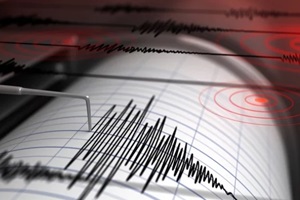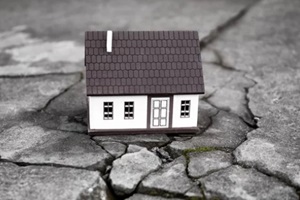 Standard homeowners, renters and condo insurance policies do not cover damage caused by earthquakes. To stay protected, it is important to have earthquake insurance. According to a report from the United States Geological Survey, nearly half of all Americans are at risk for earthquake damage.
Standard homeowners, renters and condo insurance policies do not cover damage caused by earthquakes. To stay protected, it is important to have earthquake insurance. According to a report from the United States Geological Survey, nearly half of all Americans are at risk for earthquake damage.
The report reveals that 143 million Americans live and work in areas that could experience shaking, which results in damage to structures.
Earthquake insurance can help cover these costly repairs and may provide additional living expenses coverage if a policyholder is forced to live elsewhere while their home is being repaired.
Before purchasing earthquake insurance, consider the following:
1. Do You Need Earthquake Insurance?
Having earthquake insurance is not mandatory, and although earthquakes occur in all 50 states, some locations are more prone to these natural events. According to a U.S. Geological Survey, Alaska and California have the most frequent earthquakes.
However, other states like Nevada, Utah, Montana, Idaho, Wyoming, Washington, Oregon, and Hawaii also experience high amounts of seismic activity. Homeowners can visit the USGS website to check their state’s earthquake risk.
2. Will Earthquake Insurance Provide Adequate Coverage?
Before purchasing an earthquake insurance policy, it is important to consider whether the policy will provide adequate coverage. Coverage details can vary from policy to policy, but generally, most standard earthquake insurance policies cover the following:
- Repairs to the home and attached structures, such as a garage
- Damaged possessions, such as clothing and furniture
- Additional living expenses, such as restaurant or hotel bills
Add-ons may also be available for policyholders, depending on their needs. For example, add-ons could include coverage for detached structures (e.g., toolshed or carport), debris removal, building code upgrades, emergency repairs, land restoration or exterior masonry veneer.
3. What Does Earthquake Insurance Not Cover?
It is also important to be aware of the things that earthquake insurance does not cover. Generally, earthquake insurance does not cover the following:
- Fires caused by earthquakes
- Floods
- Vehicle damage
- Masonry
- Sinkholes
- Preexisting damage
4. How Much Earthquake Coverage Do You Need?
 Homeowners often need help calculating how much earthquake coverage they actually need to protect their property. Insurance companies typically set the same limits on dwelling coverage for both home and earthquake insurance.
Homeowners often need help calculating how much earthquake coverage they actually need to protect their property. Insurance companies typically set the same limits on dwelling coverage for both home and earthquake insurance.
The amount typically reflects the estimated cost to rebuild the home, not the property’s market value. Personal property coverage limits can vary but typically start around $5,000 and can be raised to the insurer’s maximum.
However, the insurance company may put caps on certain items, such as computers. Performing a home inventory can help homeowners determine how much their possessions are worth.
5. What Is the Policy’s Deductible?
Earthquake insurance policies generally have higher deductibles than other types of home insurance. While a homeowner’s insurance policy may have a flat-rate deductible, such as $1,000, earthquake insurance deductibles are generally a percentage of the coverage limits.
Percentage rates for earthquake insurance can range from 2.5 to 25 percent, depending on the insurance company. There are also other differences when it comes to earthquake insurance deductibles.
While home insurance policies generally have one deductible that applies to the home’s structures and contents, earthquake insurance providers often separate deductibles for each component of the policy, such as the dwelling and personal property.
6. How Much Does Earthquake Insurance Cost?
The cost of earthquake insurance is dependent on a number of factors, such as the age of the home, the type of soil on the property, the building materials used in the home and the number of stories.
An insurance company will also look at the home’s total rebuilding costs, the coverage limits and deductibles chosen by the policyholder, and the home’s proximity to seismic activity and fault lines.
Is It Possible to Save Money on Earthquake Insurance?
Many insurance agencies offer homeowners ways to save on their earthquake coverage, such as by adding automatic gas shut-off valves, bolting the house to its foundation, reinforcing chimney and masonry walls, attaching the water heater to a wall or bolstering the walls around the crawl space.
Policyholders can also reduce their premiums on an earthquake insurance policy by choosing a higher deductible.
Get an Insurance Quote from Atlas Insurance
 Earthquakes can occur at any time and without warning. While it is not possible to avoid the effects of earthquakes, homeowners can protect their properties by having earthquake insurance coverage.
Earthquakes can occur at any time and without warning. While it is not possible to avoid the effects of earthquakes, homeowners can protect their properties by having earthquake insurance coverage.
Earthquake insurance is available to homeowners, renters that wish to protect their belongings and individuals who reside in condos.
When deciding whether or not to purchase earthquake insurance, it is important for people to consider whether or not they can afford to repair or rebuild their home after a big earthquake, as well as continue to pay the mortgage and taxes as they rebuild.
For more information about buying home earthquake insurance, contact Atlas Insurance Agency at (808) 400-6634.
